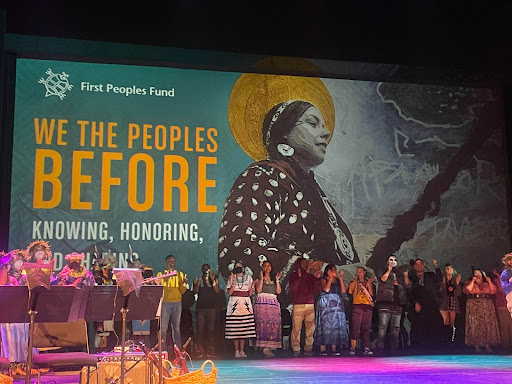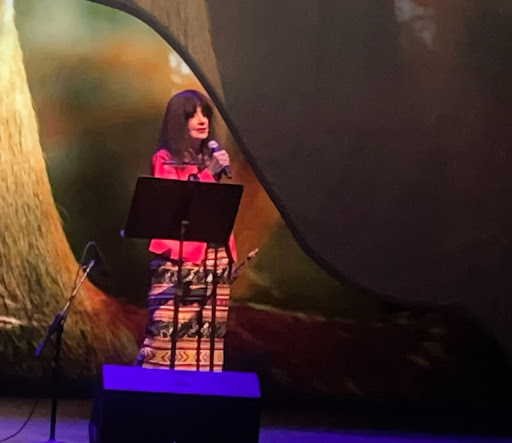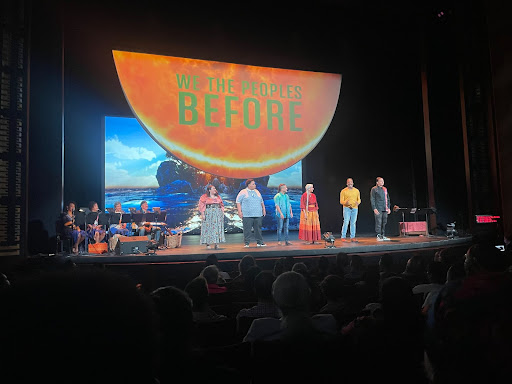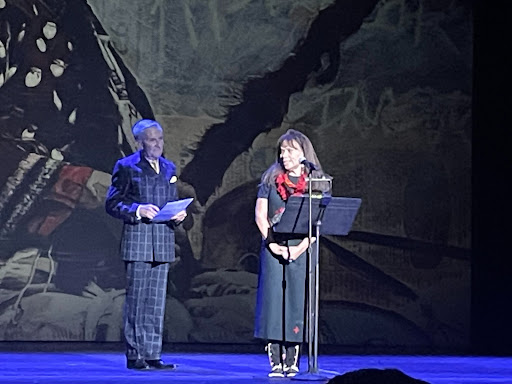
- Details
- By Levi Rickert
WASHINGTON, D.C. — The Kennedy Center’s Eisenhower Theater was sold out on Friday, July 1st for the We The Peoples Before stage production that drew a crowd of Native Americans from various parts of Indian Country as well as other attendees who sat for the two-hour long performance.
The First Peoples Fund, an organization that supports the collective spirit of Native Americans artists, hosted the event that brought more than 50 Native performers to the stage, including Joy Harjo (Muscogee Creek Nation), Supaman (Apsaalooke Nation), and Pura Fe Crescioni (Tuscarora/Taino).
 Joy Harjo (Muscogee Creek Nation)
Joy Harjo (Muscogee Creek Nation)
Friday night’s performance was part of a three-day festival that coincided with the 25th anniversary of the First Peoples Fund and the 50th anniversary of the John F. Kennedy Center.
“This location feels like the stars have aligned and here we are tonight. We are here to tell our story, as it should be told through our legs, from our hearts and from the place of resilience and love, the love for ancestral homelands and territories,” Lori Pouiri (Oglala Sioux Tribe), president of the First Peoples Fund, said during her opening remarks.
We The Peoples Before was billed as a collaboration in recognition of the rightful place of Native cultural practice as a central influence on the national landscape of arts and culture in the United States.
 A portion of the production’s cast.
A portion of the production’s cast.
The production was a spectacular performance of Native American talent that mixed narrative, song, and dance. The performance told historic stories of purposeful attempts to destroy Native peoples by genocide and the intention of stripping the Indigenous people of this continent of their land and culture.
National Center for American Indian Enterprise Development board member Ron Solimon (Laguna Pueblo) traveled with his wife from Albuquerque, New Mexico, for the festival.
“Last night’s performance was just simply sensational,” Solimon told Native News Online. “The performance left me feeling bubbly. The diversity of culture, all the singing, and the other kinds of talent that was expressed there was fabulous.”
 Richard West, Jr. (Cheyenne and Arapaho Tribes) and Lori Pouiri (Oglala Sioux Tribe)
Richard West, Jr. (Cheyenne and Arapaho Tribes) and Lori Pouiri (Oglala Sioux Tribe)
Shannon Martin (Gun Lake Tribe), accompanied her elderly parents to the Kennedy Center from Michigan. Martin, a consultant who is the former director of the Ziibiwing Center of Anishinabe Culture and Lifeways in Mt. Pleasant, Mich., said the production invoked the resiliency of our people by revisiting where we come from and understanding the hardship and the adversity we have lived through.
“The eclectic body of work highlighted both our traditional storytelling lifeways to the contemporary, dynamic storytelling of our youth through slam poetry and hip hop lyrics.
For me, the feeling of sitting in the middle of the room, the Eisenhower Theater at the Kennedy Center, surrounded by black and brown people, was just amazing,” Martin said.
Martin says she would like to see the National Endowment for the Arts fully fund the production to take it on the road and tour North America and the world because of the message and the history and the celebration of who we are as Indigenous people should be shared.
More Stories Like This
Watermark Art Center to Host “Minwaajimowinan — Good Stories” ExhibitionMuseums Alaska Awards More Than $200,000 to 12 Cultural Organizations Statewide
Zuni Youth Enrichment Project Takes Top Emerging Artist Apprentices to Phoenix for Artistic Exploration and Cultural Immersion
From Dishwasher to Award-Winning Chef: Laguna Pueblo's Josh Aragon Serves Up Albuquerque's Best Green Chile Stew
Rob Reiner's Final Work as Producer Appears to Address MMIP Crisis
Help us defend tribal sovereignty.
At Native News Online, our mission is rooted in telling the stories that strengthen sovereignty and uplift Indigenous voices — not just at year’s end, but every single day.
Because of your generosity last year, we were able to keep our reporters on the ground in tribal communities, at national gatherings and in the halls of Congress — covering the issues that matter most to Indian Country: sovereignty, culture, education, health and economic opportunity.
That support sustained us through a tough year in 2025. Now, as we look to the year ahead, we need your help right now to ensure warrior journalism remains strong — reporting that defends tribal sovereignty, amplifies Native truth, and holds power accountable.
 The stakes couldn't be higher. Your support keeps Native voices heard, Native stories told and Native sovereignty defended.
The stakes couldn't be higher. Your support keeps Native voices heard, Native stories told and Native sovereignty defended.
Stand with Warrior Journalism today.
Levi Rickert (Potawatomi), Editor & Publisher


